Affiliate vs. influencer marketing: How are they defined and which one woulad bring better results for your business?
Here’s how our digital strategist Stephanie Sharlow simply explains it:
“Influencer marketing is like paying for a billboard on a highway – you don’t really know whether it’s helping your sales grow because you can’t directly track it. On the other hand, affiliate marketing comes with a trackable link unique to each affiliate, so you know every time someone makes a purchase.”
There’s much more to each of these tactics. We’ll guide you through the ins and outs, and pros and cons of each.
Let’s find the best tactic for your brand.
Work with our digital marketing experts. Request a quote
What Is Affiliate Marketing?
Affiliate marketing is a performance-based marketing tactic where your eCommerce company advertises on other people’s websites and shares revenue with them, every time someone buys directly through a link unique to each of the affiliates.
In other words, your company will reward affiliates – individuals, organizations, media companies or publishers – with a commission for each customer brought to you, directly through the affiliate’s link.
Affiliates are incentivized to promote your company because they get a percentage of your sales revenue. The fact that they also earn, encourages them to increase their own marketing efforts to promote your products and offer you advertising space on their website.
What Is Influencer Marketing?
Influencer marketing is a digital marketing tactic where you partner with influential figures with a large following and a strong reputation on social media, like Instagram or YouTube – think bloggers, celebrities – to promote your products within the content they regularly publish.
In other words, you pay for the product placement and brand visibility in the influencer’s channel.
They have ownership and control over their audience. To help them keep their authenticity, it’s important to give influencers the freedom to determine the promotional narrative.
Instead of creating one-off campaigns, the best practice is to develop a long-lasting relationship with influencers to build consistency and accomplish long-term goals.
What Is The Difference Between Affiliate Marketing & Influencer Marketing?
The key differences between these marketing services lie in their:
- Outreach model: Affiliate marketing platforms enable you to reach hundreds of potential affiliates in seconds, while influencer marketing mostly includes one-on-one communication
- Partnership model: Your partners for affiliate programs will mostly be media platforms, online publishers and other digital entities where your ad will be displayed, while you will interact directly with YouTube stars, bloggers, Instagram influencers and other individuals for your influencer marketing campaigns
- Performance model: With affiliate marketing, you can track ad performance directly and easily measure the ROI of each campaign, while influencer marketing doesn’t allow such granular performance tracking, so it’s much more suitable for long-term campaigns
But, when we compare affiliate vs. influencer marketing, it becomes clear that besides the differences, these tactics have similarities, too.
How Are Affiliate & Influencer Marketing Similar?
Even though these are two different marketing tactics, you can include influencers in your eCommerce affiliate programs, which makes affiliate marketing for influencers a kind of a hybrid form of marketing.
The most effective approach for both influencer and affiliate programs is to partner with individuals, organizations or publishers whose audience is the best fit for your brand.
This way, you are increasing your chance of:
- Reaching people who are likely to be attracted to your brand
- Developing a trustworthy relationship with new audiences
- Growing your brand credibility and accomplishing long-term goals
Also, both influencer and affiliate marketing work best when you connect with individuals and brands that match your brand style and values. They are in the best position to promote your products and services, so engaging influencers as your affiliates gives you the best of both worlds.
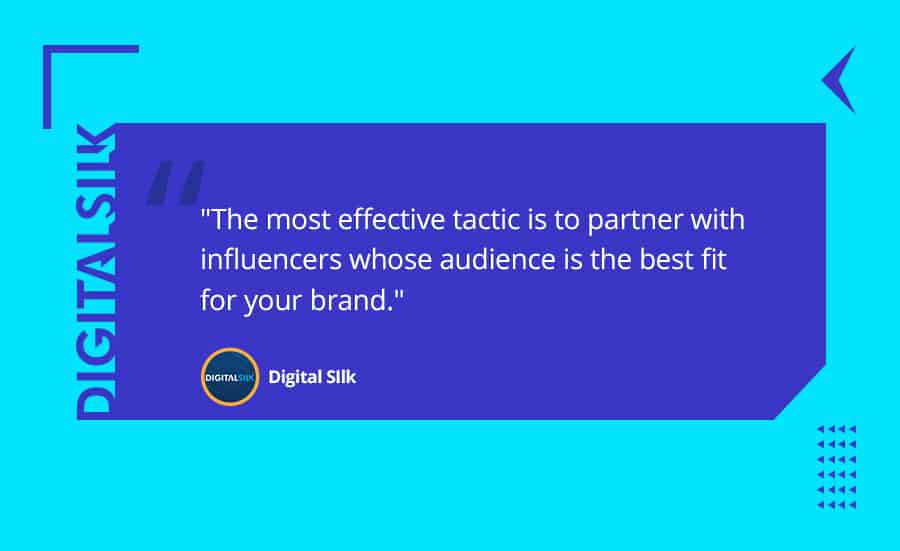
How Does Affiliate Marketing Work?
To get the most out of your eCommerce affiliate marketing campaigns, we suggest using affiliate marketing platforms such as Impact, AWIN and others.
You can begin using these platforms in several simple steps:
- Sign up and create a profile of your brand as an advertiser
- Build your profile by adding new affiliates and growing your network
- Regularly update your media hub with various ad formats and special offers
- Keep your affiliates informed about your special offers, discounts, coupons, etc.
With affiliate marketing platforms, you have the option to reach out to hundreds of affiliates in seconds, letting them know that you have a new product coming up, a new release, explain about the features and tell them everything else they need to know.
Of course, there’s no guarantee that all of the potential affiliates will enter your network.
These platforms typically have some kind of a rating system for advertisers so affiliates can choose based on the brand’s profile, previous performance, level of trust (the speed of correspondence, the speed of payment, overall rating).
As our marketing director, Madalin Durca, explains:
“Onboarding of new affiliates doesn’t happen overnight. It will depend on the level of commission and the level of trust. If you have a high level of commission, but a low level of trust, there’s less chance that you are going to build a large network of affiliates.”
Apart from platforms where you can be promoted as an advertiser and reach hundreds of potential affiliates at once, the other option is to build an affiliate network on your own by hand-picking your partners and creating tailor-made offers and ads for their platforms.
This can be a highly effective tactic, but managing affiliates on a one-by-one basis can also be time-consuming.
Either way, one of the best practices is to give your affiliates exclusive promo codes or special offers. This will help them motivate their audience to buy from you and make your revenues grow faster.
Explore this case study to see how DigitalSilk experts helped get diversified traffic and 1,341% revenue growth through affiliate marketing.
1. How Much Does Affiliate Marketing Cost?
Depending on the platform, you’ll have different fees to pay, in addition to the commission you pay affiliates, including:
- A one-time platform setup fee
- A monthly subscription
- A portion of your sales as a platform fee
So, with affiliate marketing, you pay affiliates that generate sales for you and you pay platform fees. This might be a $500 setup fee, a $3,000 monthly subscription fee or anything in between.
However, affiliates can prove to be a worthwhile investment, because:
- You only pay affiliates when they sell
- The revenue growth can be seen almost immediately
Let us quote our marketing director Madalin Durca once again:
“Affiliate marketing is based on a revenue-sharing model and it’s a win-win solution. If someone promotes your products on their website and helps you make more sales, you reward them by sharing your profit with them.”
In general, affiliate marketing provides a great ROI because you are not paying much out of pocket. Most of it is a small percentage of your revenue.
For example, your revenue can be $1 million, out of which you paid $100,000 to affiliates. So, that’s a clear 900% ROI right there.
2. How To Track Affiliate Marketing Results
One of the main advantages of affiliate marketing is the possibility to track results and manage your reputation and campaigns with data-backed decisions.
If you use an affiliate marketing platform, you’ll have access to insights within the platform, so for each of the ads on your affiliates’ websites you can track metrics such as:
- The number of clicks
- Actions performed
- The cost per action
- The revenue gained directly through an affiliate’s link
You can also track everything in Google Analytics because each of your affiliates will have a unique URL parameter to show where the traffic is coming from.
3. Can You Hire An Agency To Help You?
Absolutely!
You can do it on your own if you want to, of course. But if you’re not confident in succeeding alone, you can hire a digital agency to help you.
Marketing experts from an agency will be in charge of the platform setups, communication with affiliates and campaign management. They will regularly update affiliates about your product updates, new releases, exclusive promotions, discounts, etc.
An agency can also help you create and regularly update your media hub with all the visuals for your ads, including different formats, dimensions, color combinations, various campaigns and more.
As Madalin Durca puts it:
“Affiliate marketing should be part of a marketing strategy of every eCommerce shop. Knowing that consumers might have up to seven touchpoints until they decide to buy from you, this is a very important channel to consider. When you grow your network the right way, it can work very well in combination with other channels.”
Pros & Cons Of Affiliate Marketing
If you are considering affiliate marketing, here is an overview of the pros and cons to help you decide whether it’s a good fit for your business.
Pros
Affiliate marketing advantages and benefits include:
- It’s fast to set up: This is especially true if you use affiliate marketing platforms where you can quickly set everything up and start building your network of affiliates
- It’s cost-effective: It’s a performance-based tactic with a revenue-sharing model, so you pay only if your affiliates help you sell and there’s almost always a good ROI
- You can track results: The most important element of affiliate marketing campaigns is the possibility to track results on a platform or within Google Analytics
- You can acquire high-value leads: Finding affiliate partners with a similar target audience as yours helps you promote your brand to the right people and acquire highly-qualified leads
- Revenue growth is visible almost immediately: For each affiliate campaign, especially time-sensitive offers, you can see the results fast and have new customers buying from you almost immediately
Cons
Some of the downsides of affiliate marketing include:
- It works better for short-term campaigns: Affiliate marketing is a great solution for promoting product launches, new collections, seasonal discounts, special offers customized for each affiliate and more, but compared to influencer marketing, it doesn’t work that well long-term
- Building a strong network can take time: If you’re just starting out, building a strong profile on affiliate marketing platforms and growing your network of affiliates that match your industry, niche, audience and brand style can take a while
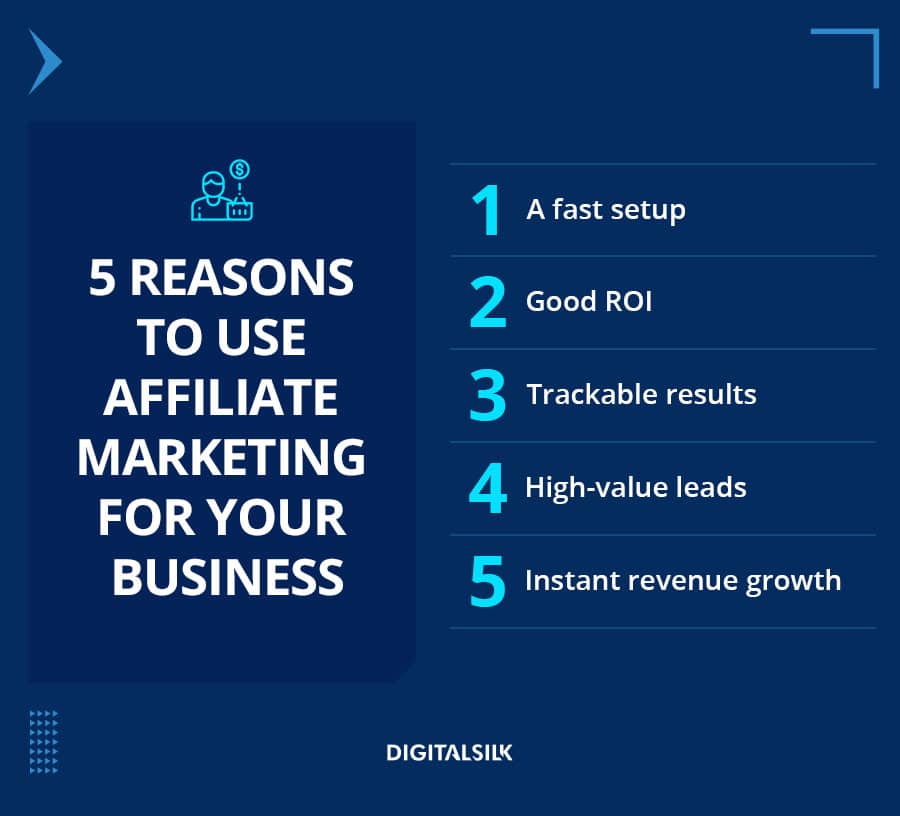
How Does Influencer Marketing Work?
While influencer marketing platforms exist, the relationship with influencers is typically one-on-one. It’s all about nurturing relationships and growing your brand.
If you want to start a campaign, you can discuss with an influencer whether you want them to:
- Only mention your product(s) among other brands as a recommendation
- Talk exclusively about your product(s) in a post (image/video and a long-form caption)
- Dedicate a series of posts and stories across channels and platforms to promote your brand
The best practice is for influencers to be transparent and note when a particular post is part of a paid partnership.
This is where the Paid Partnership feature on Instagram comes in handy. This feature enables you to approve influencers as business partners. So, every time they tag your business in a Paid Partnership post, you’ll be able to see reach, engagement rates and other insights related to that post.
Whether influencers openly say they are being paid for the promotion or they don’t mention it at all, the influence they have on their followers can be a highly effective tactic for brand promotion.
That’s why you should build lasting relationships with influencers to help them stay connected with your company and up to date with your new services, products and ideas. They are your third-party marketers, so keep them close to your brand.
1. How To Spot An Influencer
There is no set rule that determines when someone is an influencer, but you can usually spot one based on the size of their followers. Typically, a person with 5,000+ followers on at least one social media platform can be considered an influencer.
There are exceptions, of course, along with different influencer categories:
- Nano-influencers: Emerging online figures with 1,000-10,000 highly engaged followers
- Micro-influencers: Individuals or brands with 10,000-100,000 followers and a strong community within a specific niche
- Mid-level influencers: Individuals or brands with a base of 100,000-500,000 followers
- Macro-influencers: Individuals and brands with 500,000-1,000,000 global followers
- Celebrities: With a 1M+ follower base of a widely diverse audience on a global scale
Typically, promotions via celebrities with a multi-million fanbase have proven to be the least cost-effective solution because their audiences aren’t as engaged.
That’s why many brands have moved their focus to micro-influencers, to leverage their strong communities and social influence in their field.
Note: During the COVID-19 pandemic, many nano- and micro-influencers began supporting local small businesses, artisan shops and creative professionals – without being paid for it – which made their influence and credibility even stronger.
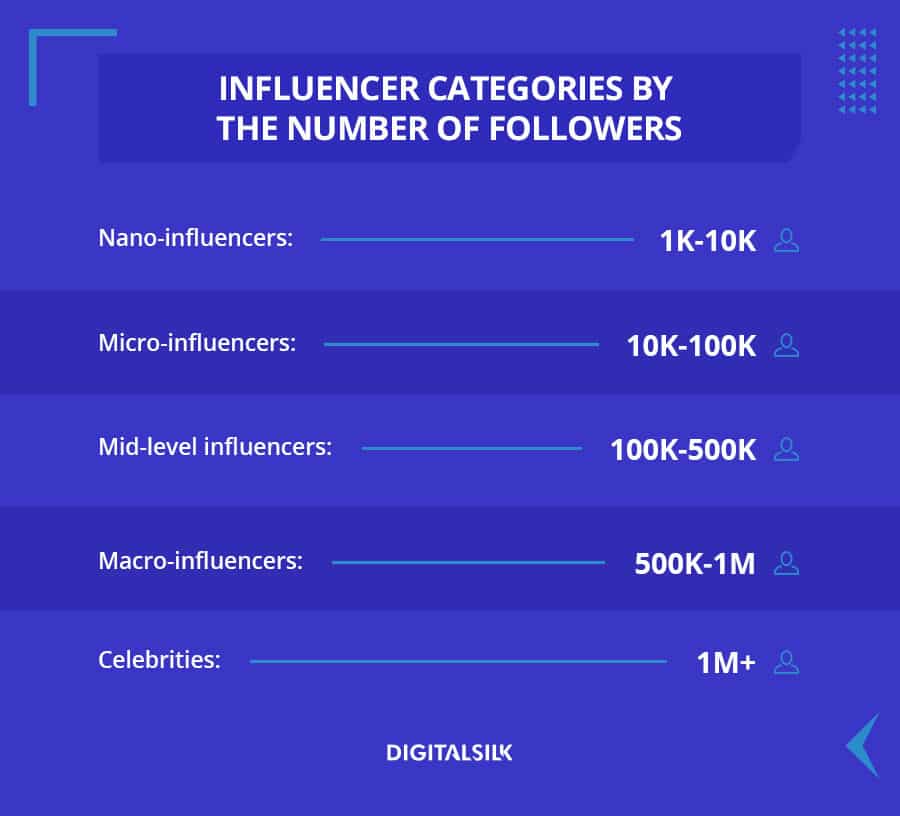
2. How To Find The Best Influencers For Your Brand
To decide whether someone is the right influencer for your brand will depend on many factors, including:
- Whether their target audience matches yours
- The strength of their online community
- The level of impact they have on their audience
- Their audience engagement rate in the comments
- Whether they’re collaborating with your competitors
Besides that, the best match will include influencers who align with your brand values, as well as with your campaign budget, goals and key performance indicators (KPIs).
3. Is Influencer Marketing Worth The Investment?
The short answer is – it depends on your goals.
But let’s elaborate a bit and dive into the cost to find out whether or not it pays off.
Typically, you’ll pay influencers a flat fee up front and the price will vary depending on their audience size and popularity, as well as the scope of the promotion.
Since you pay for getting visibility on influencers’ channels, this tactic is excellent for brand building, but not for the immediate performance. The performance of influencers is typically hard to measure and evaluate.
Here’s one possible scenario:
- A prospective customer sees an influencer’s post about your products
- They type your product name in Google to find out more
- They continue to research and compare your product to competitors’
- They start following you on social media
- They make their first purchase weeks later
So, in this scenario, what started with an influencer’s post did lead to a conversion eventually, but it’s not something you can track.
In another scenario, you may rake in $10,000 in revenue by the end of the campaign, but if you paid $20,000 to influencers, this would mean you actually lost money short term.
Keep in mind that it also takes time to set everything up. The number of hours you’ll need to invest in influencer marketing setup and relationship building will depend on how many influencers you are collaborating with.
Gains from influencer marketing don’t come immediately. You need to invest both time and money, but the results you get in the long-term could be better than those from affiliate marketing.
In fact, 48% of marketers say that ROI gained from influencer marketing is better than ROI gained from other marketing channels.
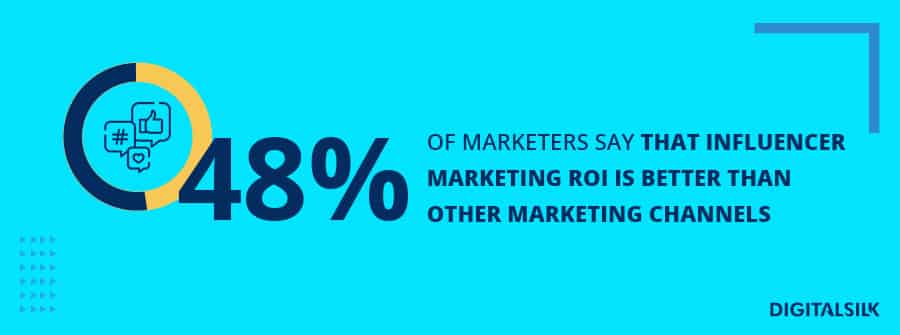
Pros & Cons Of Influencer Marketing
Let’s zoom out and take a look at an overview of the influencer marketing pros and cons.
Pros
Influencer marketing can help you:
- Access targeted audiences: Partnering with influential online figures in a specific niche gives you access to carefully targeted audiences and lets you grow your base of potential customers
- Increase brand awareness: Even a simple brand shoutout coming from an influencer with thousands of followers can help people discover your products and start an interaction with your brand
- Build brand credibility: It’s one thing to self-promote how amazing your products are, but when someone else says it – and that someone has a strong influence on a huge audience – it counts
- Expand to new markets: Influencers don’t have to be in the same industry as you, so you can use influencer marketing to scale up your business, reach new markets and start working internationally
- Accomplish long-term goals: The biggest advantage of influencer marketing is building strong, lasting relationships that can help you accomplish your long-term goals
Cons
The downsides of influencer marketing include:
- You can’t measure the performance: Because you can’t accurately track influencer marketing performance, you can’t directly measure the success
- It takes longer to set up: Compared to affiliate marketing, influencer campaigns can take much more time to establish a partnership and start seeing sales growth
- It can be a costly solution: This is especially true if you want to partner with macro-influencers or celebrities, which may cost thousands of dollars for a single post
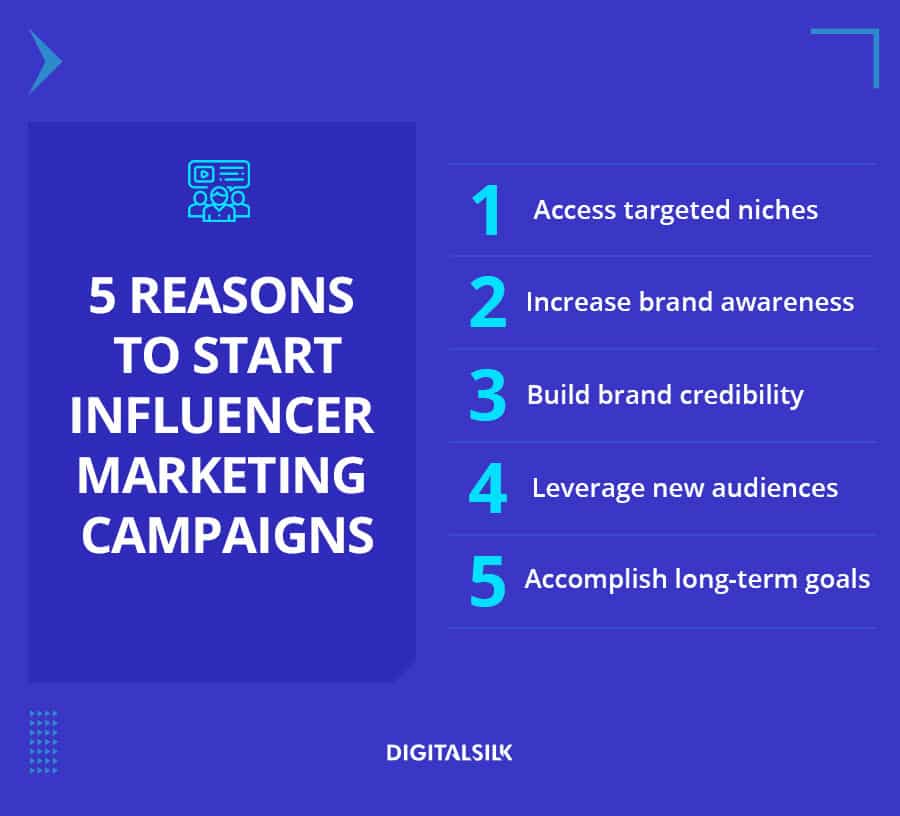
Affiliate vs. Influencer Marketing: The Final Verdict
Do we have a winner in this affiliate vs. influencer battle?
One thing is for sure – choosing between these tactics for your digital marketing efforts should be easier now that you understand how they work and what the advantages and disadvantages of each tactic are.
To wrap it all up, here is a final overview to help you make a well-informed, strategic decision about how these tactics can support your customer acquisition goals.
Influencer marketing is better for establishing brand credibility and increasing awareness, but if you want to see your revenues grow fast, then affiliate marketing is a better solution for you.
However, in both tactics, you need to nurture the channel.
If you want to make a strategic decision and accomplish short-term and long-term goals, you should use both affiliate and influencer marketing.
As our marketing director Madalin Durca concludes:
“Every channel you build creates more opportunities for your users to convert. Build your network of affiliates and influencers carefully and patiently and you’ll see the results.”
"*" indicates required fields



